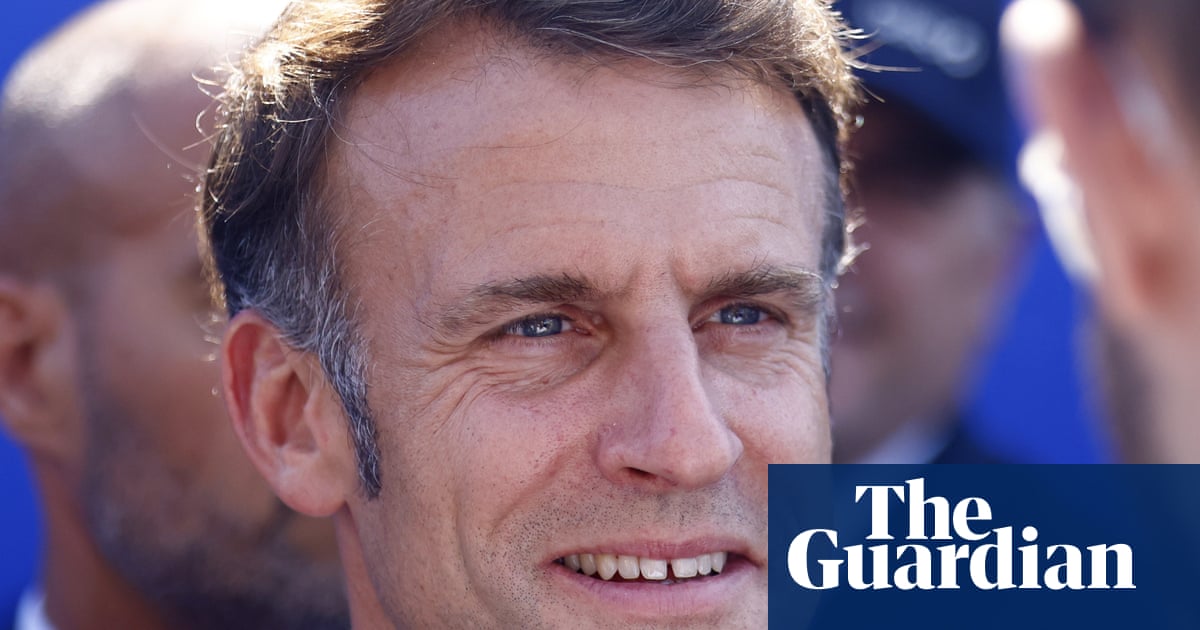Europe is to make Iran a comprehensive offer to end its war with Israel that would include an Iranian move to zero uranium enrichment, restrictions on its ballistic missile programme and an end to Tehran’s funding of terrorist groups, Emmanuel Macron has said.
The proposals are surprisingly broad, spanning a range of complex issues beyond Iran’s disputed nuclear programme, and are likely to complicate any solution unless an interim agreement can be agreed.
One proposal recently aired is for Iran to suspend uranium enrichment for the duration of Donald Trump’s US presidency. The concept of uranium enrichment being overseen by aconsortium of Middle East countries– including Iran, Saudi Arabia and the United Arab Emirates – remains on the table.
Iran has insisted it cannot abandon its right to enrich uranium within its territory, but the pressure to make concessions is intense both internally and externally.
Macron aired his ideas on Friday as European foreign ministers held talks with their Iranian counterpart, Abbas Araghchi, in Geneva. It is the first time Araghchi has met western-based diplomats in person since the launch of the surprise Israeli offensive against Iran a week ago.
Araghchi has spoken by phone to the US special envoy to the Middle East, Steve Witkoff, and has told him he will not revive US-Iran talks in person until Israel ends its strikes.
Before leaving for Geneva, Araghchi said: “In a situation where aggression … continues, the Americans want negotiations and have sent messages several times, but we have clearly said that there is no room for dialogue until the aggression and aggressor stop. We have no talks with America as a partner in this crime.”
The talks in Switzerland are being held against the backdrop of a week of Israeli and Iranian strikes against each other. Trump, after days of threats followed by prevarication, said on Thursday he woulddelay for a fortnightany decision on whether to join Israel’s military action. But such is the US president’s unreliability, in Tehran’s view, that it sees his commitment as valueless.
The foreign ministers fromGermany, France and the UK have consulted the US closely but diplomatic sources said they were going to Geneva stressing their belief in de-escalation and the need for dialogue. The UK foreign secretary, David Lammy, met the US secretary of state, Marco Rubio, in Washington on Thursday to talk about the US red lines.
Macron, already accused by Trump of publicity-seeking this week, set out a daunting agenda. “It’s absolutely essential to prioritise a return to substantial negotiations, including nuclear negotiations to move towards zero [uranium] enrichment, ballistic negotiations to limit Iran’s activities and capabilities, and the financing of all terrorist groups and destabilisation of the region that Iran has been carrying out for several years,” he said.
He warned against the use of force, adding in a reference to Iran’s uranium enrichment facility atFordow: “No one can seriously believe that this threat can be met with [Israel’s] current operations alone. Why? Because there are some [nuclear] plants that are highly protected and because today no one knows exactly where’s the uranium enriched to 60%. So we need to regain control on [Iran’s nuclear] programme through technical expertise and negotiation.”
In the previous five rounds of talks, the US insisted that Iran end its entire domestic uranium enrichment programme, but said it would allow Iran to retain a civil nuclear programme, including by importing enriched uranium from a multinational consortium.
Iran claims that as a signatory to the nuclear non-proliferation treaty (NPT), it has an absolute legal right to enrich uranium, a position neither the European or American powers have ever endorsed. In the past, European negotiators have proved more adept than their US partners in finding compromises, including the temporary suspension of domestic enrichment, a principle Tehran reluctantly endorsed in 2003-4.
In the Paris agreement in 2004,France, Germany and the UK alongside the rest of the EU avoided the issue of whether Iran had a right to enrich by saying instead it recognised that Iran’s suspension of enrichment was “a voluntary confidence-building measure and not a legal obligation”. The UK position is that the NPT neither grants an absolute right to enrich nor bans it.
Judging by Macron’s remarks, Europe senses that the US demand for an end to enrichment is non-negotiable.
Such is the tension around the talks that one of Araghchi’s advisers, Mohammad Hossein Ranjbaran, claimed Israel had tried to assassinate the foreign minister, and that guarantees had been sought about his safe passage to Europe.
Russia has offered to mediate talks, a proposal rejected by European leaders.
Iran may be in aweak position militarilywith its air defences down, but for as long as the US delays a decision on whether to use its unique “bunker busting” bombs to try to destroy the Fordow plant, the Israeli prime minister is in a quandary.
Benjamin Netanyahu’shopes for regime changeinside Iran have also been dealt a blow since even opponents of the Iranian government, both domestic and foreign, do not support his assault. Narges Mohammadi, the Iranian Nobel peace prize winner, said in a message to Trump: “Not only do not join this war but seek to stop it and establish peace throughout the Middle East.”
A large turnout for Friday prayers in Tehran suggested Israel had created an atmosphere of rare national unity in the face of an external enemy.
That has left Reza Pahlavi, the exiled son of the former shah and opponent of the regime, relatively isolated in closely associating himself with Israel.
Some reformists are arguing internally that enrichment is a sovereign right but that if it comes at the expense of the country’s destruction then that right should be suspended.
